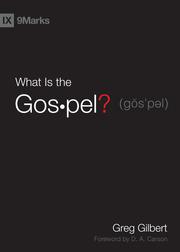I think this book does a good job of answering its own title, and giving an in-depth analysis of the “four parts” of the Gospel, which are attributed to the Gospel writers in the book: God, Man, Jesus, Response. I can tell the book is written from a pastor who is a bit jaded about the various recantations of the Gospel he’s heard from across America; as a 23 year old, I don’t have that luxury, and as a result, I often found myself reading these weird recantations and thinking “I’ve never heard anyone claim that,” but I’m sure I will in the future as I’m exposed to more American gospel material.
Here’s how I’d define the gospel after reading this book: in the beginning God created Adam and Eve, and they chose to rebel (read: “sin”) against God’s instructions, thus condemning the entire race to sin’s penalty, which is separation from God. Even today, we all sin; “For all have sinned and fallen short.” The Old Testament includes descriptions of penal substitution of sin’s penalty when it describes the Israelites sacrificing unblemished animals, e.g. The Passover. The OT also foretells the coming of a “suffering servant” and savior who redeems the human race. In the NT, Jesus’s perfect life is described, including his claims to Godhood and foretelling of his death and resurrection. When he dies, he takes on the full penalty of sin, allowing those who “choose to believe in him” to have their sins forgiven by his sacrifice. Those that choose to believe in him show fruit in their life, not by being perfect, but by choosing to repent (turn away) from sin to the best of their ability, and choosing to trust in Jesus’s power to cover their sins at the day of judgement, whose timing is unknown.
So yeah. I think this book is great for people who want a comprehensive understanding of the gospel, which makes it easier to share this “good news” with other people, and condense the Bible down to some simpler statements. Not really a must-read.
Notes
Before reading this book, I asked myself “what is the gospel?” to see if this book changes my mind. Here’s what I said:
The gospel is the “good news” that God the father sent his son, Jesus Christ, to die for our sins on the cross, so that those who accept Jesus into their hearts have their sins forgiven, are reconciled to God, and spend eternity in heaven with Him. This news is the solution to the separation that started in Genesis when God left the garden. According to the Reformed movement, the gospel is “open to anyone” but only God’s elect will choose it; he chooses us, not the other way around.
Now for notes during the book:
In most accounts of the Gospel in the new testament, there are 4 key elements:
- God (all-powerful, all-good, creator)
- Man (sinful)
- Jesus (life/death/resurrection)
- Response (believe in Jesus)
People like to think that God is love, and that he forgives all without punishment. What people really want is a God that forgives their sin, but not other “worse” sin of other people.
The Lord, the Lord, the compassionate and gracious God, slow to anger, abounding in love and faithfulness, maintaining love to thousands, and forgiving wickedness, rebellion, and sin. Yet he does not leave the guilty unpunished.
— Exodus 34:6-7
- Faith isn’t “trusting something for which you have no proof.” It’s trusting that Jesus will act as a penal substitute for your sins and not burdening yourself with the responsibility of being a “good enough” person to get into heaven.
At the end of the day, I wonder if the impulse to shove the cross out of the center of the gospel comes from the bar fact that the world just doesn’t like the cross. At best they think it is a ridiculous fairy tale, and at worst, a monstrous lie. Really, that shouldn’t surprise us. Paul told us it would be the case. The message of the cross, he said, will be a stumbling block to some and foolishness to the rest!
— p. 109
The book covers 3 “incorrect definitions” of the Gospel, and essentially, the main point is that each one is not wrong, but either doesn’t comprehensively describe the gospel, or places an emphasis on something other than Jesus’s death, resurrection, and how you can respond to that.
